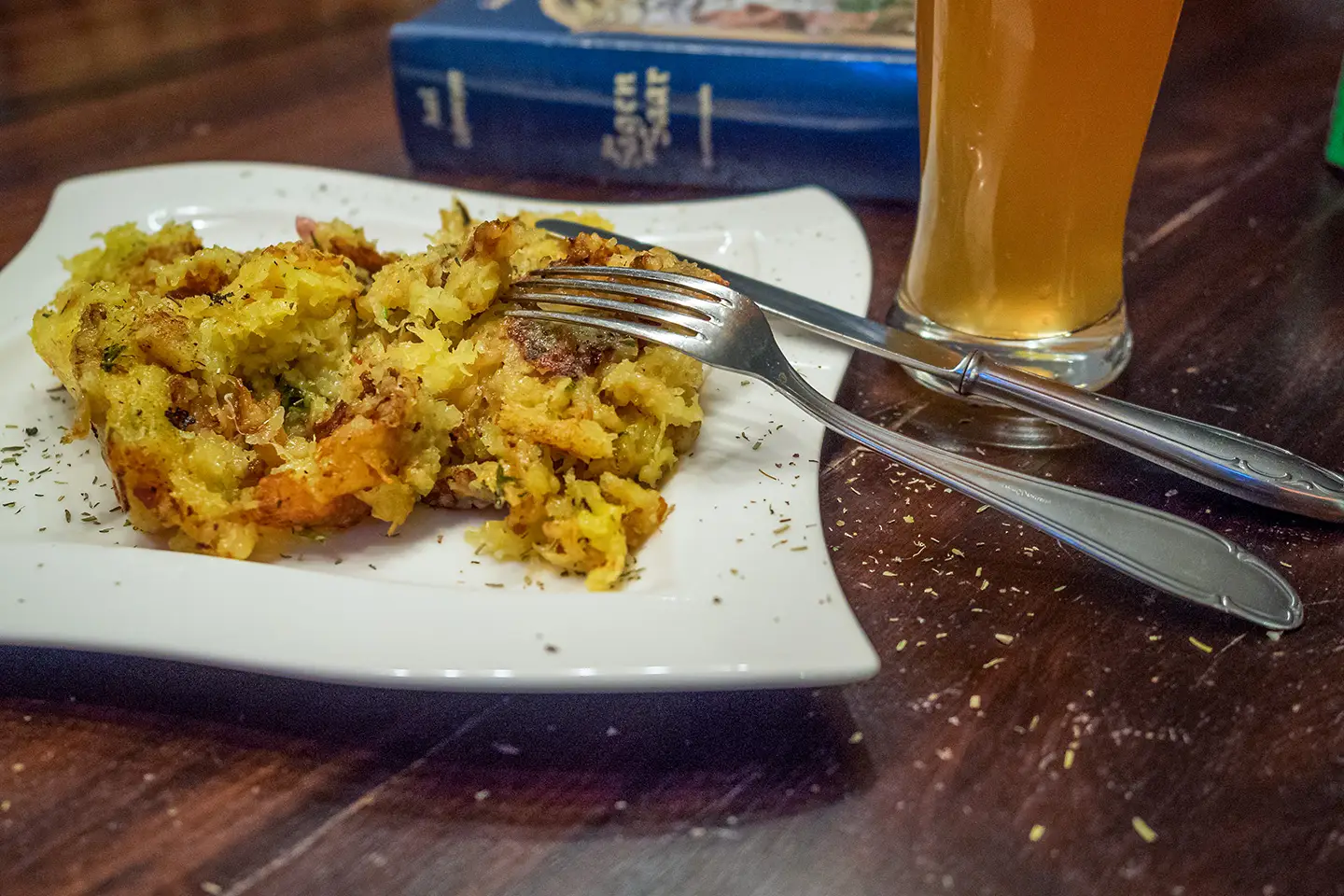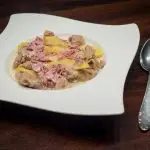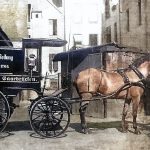Dibbelabbes und Schales
Dibbelabbes und Schales
When you arrive in Saarbrücken as a student, Dibbelabbes is very likely the first local dish you’ll encounter—at least that’s how it was in my student days. The reason (and perhaps still today) is that the cafeteria at Saarland University offered “Vegetarian Dibbelabbes” about once a week. You’ll also see Dibbelabbes stands at city festivals, Christmas markets, and the like—hard to miss. I was very familiar with the dish already, because my mother is from the Rhineland, and ever since childhood I’ve known the Rhenish Döppekooche on special occasions. The ingredients are nearly the same, and even the names suggest a kinship—Döppe and Dibbe being dialect words for “pot.” And yet the dishes are not identical, because the true counterpart to Rhenish Döppekooche is Schales, as it’s known in the Saarland but also in the Palatinate.

As you may have gathered, Schales and Dibbelabbes use almost the same ingredients. However, Schales, like Döppekooche, is a potato “cake” baked in the oven until a brown crust forms on the bottom. [2] Dibbelabbes, by contrast, is cooked on the stovetop in a pot or pan. Frequent turning and “pulling apart” of the mixture creates lots of crusty bits in the pan. As mentioned above, the word Dibbelabbes contains the Saarland term Dibbe (“pot”). In some regions, Dibbelabbes is also called Rierschales (“stirred schales”), which neatly captures the difference between the two dishes. [1]
The dish shown in the photo, by the way, was sold to me as Schales at the Saarbrücken Christkindlmarkt on December 18, 2016. I took it home, photographed it, and then polished it off. I watched the two lovely middle-aged ladies at the stall prepare it for a while. If you ask me, this was clearly Dibbelabbes, not Schales. But no one asked me…
Ingredients for Schales and Dibbelabbes
- 2 kg raw potatoes
- 2 leeks for Schales or 2 large onions for Dibbelabbes
- 1 egg
- 250 g cured pork (bacon/lardons) (omit for the vegetarian Dibbelabbes)
- Salt, nutmeg, pepper, a little oil
Preparation – Schales
Finely grate the raw potatoes and squeeze them out well in a dish towel; dice the leek finely. Mix the egg and leek with the potatoes and season with salt, pepper, and nutmeg.
Fry the cured pork in a cast-iron roaster or pan. Then add the potato–leek mixture to the roaster, or combine both in a baking dish and mix well.
Bake the potato casserole at 200 °C (392 °F) for about 2 hours, until nicely browned.
Preparation – Dibbelabbes
Again, finely grate the raw potatoes and squeeze them out well in a dish towel. Peel and grate the onions, then mix with the potatoes and egg; season with salt, pepper, and nutmeg.
Heat oil in a cast-iron roaster, sturdy pan, or pot. For the version with cured pork, dice it and fry first. Whether with or without cured pork, add the Dibbelabbes mixture to the hot oil.
Now, for as long as the cook deems right, keep frying, turning, and pulling the mixture apart so that plenty of little crusts form (known in Saarland dialect as “Herschdscher”).
Note on Both Recipes
These dishes are typically served with something sweet on the side. You’ll read about applesauce, stewed plums, poached pears, and more. In Saarbrücken, applesauce is the absolute standard!
References
[1] See, e.g., online: https://ntschotschi.wordpress.com/2011/06/25/unterschied-zwischen-schales-dibbelabbes, accessed 21 Oct 2016.
[2] Allkemper, Gisela; Schütz, Gabriele: Das Kochbuch aus dem Saarland; Hölker Verlag, Münster 1977, pp. 64–65.
Comments are closed.


